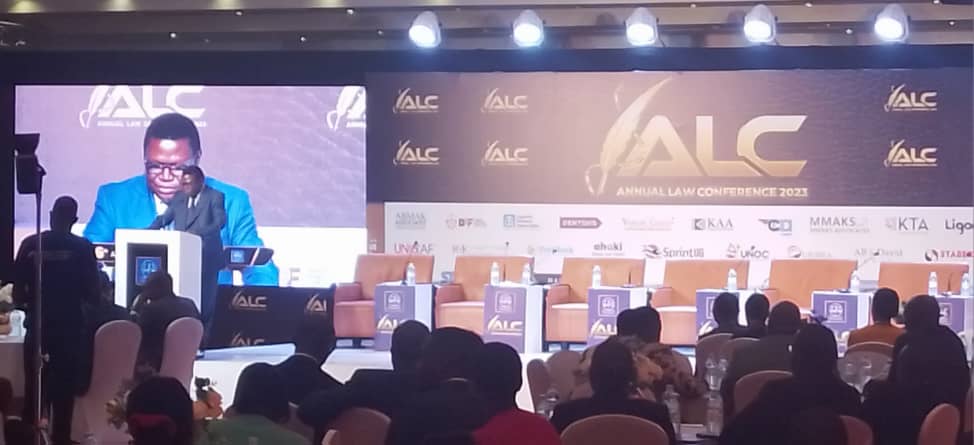Ethical legal practice key to sustaining Uganda’s economic transformation lawyers told

A successful economy and a sound legal system are mutually interdependent, lawyers attending the sixth edition of the Uganda Law Society’s (ULS), Annual Legal Conference heard. The much-anticipated event opened in Kampala August 24, with the country’s legal fraternity pondering what the opportunities and uncertainties of a rapidly shifting landscape, driven by innovations in Artificial Intelligence mean for the future of legal practice.
Setting the tone for the conference that is running under the theme, ‘Redefining legal practice in the age of disruption;’ ULS President Bernard Oundo urged practitioners to be customer-centric by looking at their value proposition from the client’s perspective.
“How do we create value for the clients we serve in the age of disruption? By the understanding the drivers of our client’s businesses from the local regional and international perspectives,” he answered his own question.
“We cannot create value unless we understand the challenges of our times. And when we understand the value question from the client perspective, then we shall be able to understand the opportunities that we should harness, diversify our businesses and contribute to the growth of our economy he added.
While acknowledging the challenges of a rapidly shifting landscape driven by technological innovation, Attorney General Kiryowa Kiwanuka, said safeguarding the credibility of the profession was paramount and personal conduct and ethics were the north star that should guide practitioners to survival and success.
Minister of Justice and Constitutional Affairs Norbert Mao said in “facing the brave new world,” lawyers would need to be agile, “evolving and adapting” to change without losing sight of the core values of the profession. Change should not be alarming because it is a constant, but how one adapts matters because it is a key determinant of outcomes.
In his keynote address, Dr Joseph Muvawala, the executive director of the National Planning Authority, highlighted the ongoing structural transformation of the economy and the opportunities and challenges associated with Uganda’s deepening integration into the regional and global economy. Quoting grandfather of economics Adam Smith Muvawala said the law brings sanity to business and economic systems would be chaotic without contracts for instance.
However, to serve its purpose of sanitizing the business space, the law needs to be predictable and efficient, Muvawala noted.
Failing that, the resulting vacuum would result in uncertainty, a sure way of breeding speculation and black markets.
“We want to see a legal system and lawyers that facilitate the economy; we want to see you balance the law and efficiency of the law,” Muvawala emphasized, before concluding that economic systems in Uganda cannot function optimally in the absence of” good lawyers, good prosecutors and a good parliament.”

 African Heads of state head to South Korea next week for Summit talks
African Heads of state head to South Korea next week for Summit talks
 Trading leads as main source of income for Ugandans
Trading leads as main source of income for Ugandans
 New leadership for bankers’ umbrella as total assets top $12 billion
New leadership for bankers’ umbrella as total assets top $12 billion
 Brussels Airlines to announce Nairobi service
Brussels Airlines to announce Nairobi service
 SITA promises enhanced travel experience after Materna acquisition
SITA promises enhanced travel experience after Materna acquisition
 Saudia’s 105 aircraft order stretches A320neo lead over rival Max
Saudia’s 105 aircraft order stretches A320neo lead over rival Max
